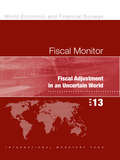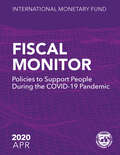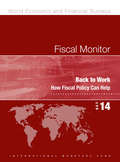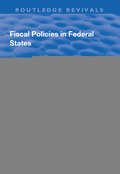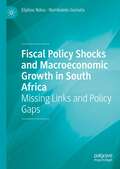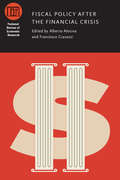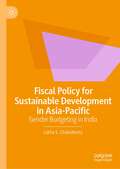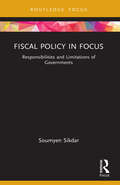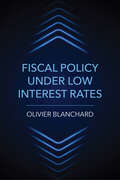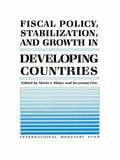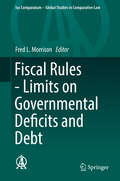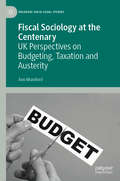- Table View
- List View
Fiscal Monitor April 2013: Fiscal Adjustment in an Uncertain World
by International Monetary FundA report from the International Monetary Fund.
Fiscal Monitor, April 2020: Policies To Support People During The Covid-19 Pandemic (Fiscal Monitor Ser.)
by International Monetary FundA report from the International Monetary Fund.
Fiscal Monitor, October 2014: Back to Work How Fiscal Policy Can Help
by International Monetary FundA report from the International Monetary Fund.
Fiscal Objective in the Post IMF Program World: The Case of Albania
by Jiri JonasA report from the International Monetary Fund.
Fiscal Policies in Federal States
by Dietmar BraunThis title was first published in 2003.Investigating the impact of federal structure on fiscal policy-making in four country cases, this book answers the question as to what extent federal structures hinder or, on the contrary, enhance a state's decision and co-ordination capacity in the field of fiscal policy. It questions the common assumption that federal structures restrain the co-ordination and hence macroeconomic management capacity. Well-documented and meticulously presented, this book will be useful for all those working in the field of policy research, and more generally for those who wish not only to attain a deeper and more comprehensive view on fiscal policy making or federalism, but on the territorial dimension of fiscal policy.
Fiscal Policy Issues During the Transition in Russia
by Augusto Lopez-Claros Sergei V. AlexashenkoSince 1992, the Russian Federation has moved away from a command economy and has laid the foundation of a market-based system. This paper examines some of the key fiscal policy issues that arose in 1992-96, the period following the onset of economic liberalization and reform.
Fiscal Policy Making in the European Union: An Assessment of Current Practice and Challenges
by Martin Larch João Nogueira MartinsThis book examines key aspects of the measurement of fiscal policy making in the EU fiscal surveillance framework, highlighting strengths and weaknesses of current assessment practice. Based on the proceedings of a workshop organized by the European Commission’s Directorate-General Economic and Financial Affairs, the book’s contributions from leading experts will be of particular value to individuals and institutions involved in the fields of national and international economics and finance. Key Features: chapters are arranged within three main sections: Long-term sustainability; Measurement of the underlying budgetary position and discretionary fiscal policy; Reliability of fiscal indicators edited by Martin Larch and João Nogueira Martins expert contributors include António Afonso, Fabrizio Balassone, Fernando Ballabriga, Roy Barrell, Peter Brandner, Peter Claeys, Leopold Diebalek, Per Eckefeldt, Jonas Fischer, Daniele Franco, Jagadeesh Gokhale, Ian Hurst, Walpurga Köhler-Töglhofer, György Kopits, Martin Larch, Carlos Martinez-Mongay, James Mitchell, João Nogueira Martins, Jan in ’t Veld, Stefania Zotteri text amply supported by charts and tables. bibliography and Index
Fiscal Policy Rules for Oil Producing Countries: A Welfare-Based Assessment
by Wojciech MaliszewskiA report from the International Monetary Fund.
Fiscal Policy Shocks and Macroeconomic Growth in South Africa: Missing Links and Policy Gaps
by Eliphas Ndou Nombulelo GumataThis book explores the disconnect between fiscal policy and macroeconomic development in South Africa. It analyses the factors that have contributed to the lack of economic growth in the country over recent decades and outlines an improved fiscal policy framework that increases investment and employment. Particular attention is given to the impact of government debt and its relationship with GDP, the connection between budget deficits and interest rates, and how economic policy uncertainty affects employment dynamics and inflation. This book provides practical fiscal policy suggestions to increase economic growth in South Africa and Africa more generally. It will be relevant to researchers and policymakers interested in African economics and economic policy.
Fiscal Policy after the Financial Crisis (National Bureau of Economic Research Conference Report)
by Alberto Alesina Francesco GiavazziThe recent recession has brought fiscal policy back to the forefront, with economists and policy makers struggling to reach a consensus on highly political issues like tax rates and government spending. At the heart of the debate are fiscal multipliers, whose size and sensitivity determine the power of such policies to influence economic growth. "Fiscal Policy after the Financial Crisis" focuses on the effects of fiscal stimuli and increased government spending, with contributions that consider the measurement of the multiplier effect and its size. In the face of uncertainty over the sustainability of recent economic policies, further contributions to this volume discuss the merits of alternate means of debt reduction through decreased government spending or increased taxes. A final section examines how the short-term political forces driving fiscal policy might be balanced with aspects of the long-term planning governing monetary policy. A direct intervention in timely debates, "Fiscal Policy after the Financial Crisis "offers invaluable insights about various responses to the recent financial crisis.
Fiscal Policy and Economic Cycles in Oil-Exporting Countries
by Aasim M. Husain Kamilya Tazhibayeva Anna Ter-MartirosyanA report from the International Monetary Fund.
Fiscal Policy and Economic Development
by Alex Mourmouras Peter RangazasA report from the International Monetary Fund.
Fiscal Policy and the Current Account
by Jacques Bouhga-Hagbe Paolo Mauro S. M. Ali Abbas Antonio J. Fatás Ricardo C. VellosoA report from the International Monetary Fund.
Fiscal Policy for Sustainable Development in Asia-Pacific: Gender Budgeting in India
by Lekha S. ChakrabortyThis book examines how macro-fiscal policy can lead to gender-aware human development in an emerging economy like India, with special reference to gender budgeting. Integrating gender lens in macro-fiscal policies has been widely recognized in international and national policy making and budgeting. The book highlights the gender diagnosis—the measurement issues relate to construction of gender outcome variables; the statistical invisibility of unpaid care economy sector and how deficiency in public infrastructure can accentuate the private costs; the analytical link between gender outcome variables and macro-fiscal policy frameworks; the role and impact of fiscal transfers on gender equality outcomes at subnational levels; time series of gender budgets in India across sectors and its fiscal marksmanship; gender disaggregated public expenditure benefit incidence analysis to understand the distributional impacts of public spending on women across income quintiles and suggest policy alternatives. The book uses unique database—time use survey data and the disaggregated demand for grants, expenditure budgets using gender lens. The book employs case study, simple statistical tools for the analysis and econometric methodology.
Fiscal Policy in Focus: Responsibilities and Limitations of Governments (Routledge Focus on Management and Society)
by Soumyen SikdarThe majority of economists today are opposed to allowing governments a significant role in economic affairs. In particular, demand management and redistributive policies are frowned upon, and supply-side policies (that concentrate on enhancing the profitability of business operations) are advocated as the only legitimate channels of government action. The possibility of ‘government failure’ in the economic sphere is endlessly emphasised.The book argues that this view is only partially correct, at best. To make development inclusive and sustainable over the long run, the state must step in as an active enabler and regulator of private initiative. In a good society, the public–private relationship should be complementary, not adversarial. The enabler–regulator duty of the government cannot be effectively discharged with only supply-side and monetary instruments. Well-designed, effectively implemented fiscal action is indispensable for promoting social welfare with its twin aspects of efficiency and distributive justice.Within a short compass, the strengths and limitations of tax expenditure policies in managing the economy are discussed in non-technical language, keeping the ‘government failure vs market failure’ debate as a focal point.
Fiscal Policy in Oil Producing Countries During the Recent Oil Price Cycle
by Mauricio Villafuerte Pablo Lopez-MurphyA report from the International Monetary Fund.
Fiscal Policy under Low Interest Rates
by Olivier BlanchardRethinking fiscal and monetary policy in an economic environment of high debt and low interest rates.Policy makers in advanced economies find themselves in an unusual fiscal environment: debt ratios are historically high, and—once the fight against inflation is won—real interest rates will likely be very low again. This combination calls for a rethinking of the role of fiscal and monetary policy—and this is just what Olivier Blanchard proposes in Fiscal Policy under Low Interest Rates.There is a wide set of opinions about the direction that fiscal policy should take. Some, pointing to the high debt levels, make debt reduction an absolute priority. Others, pointing to the low interest rates, are less worried; they suggest that there is still fiscal space, and, if justified, further increases in debt should not be ruled out. Blanchard argues that low interest rates decrease not only the fiscal costs of debt but also the welfare costs of debt. At the same time, he shows how low rates decrease the room to maneuver in monetary policy—and thus increase the benefits of using fiscal policy, including deficits and debt, for macroeconomic stabilization. In short, low rates imply lower costs and higher benefits of debt.Having sketched what optimal policy looks like, Blanchard considers three examples of fiscal policy in action: fiscal consolidation in the wake of the Global Financial Crisis, the large increase in debt in Japan, and the current US fiscal and monetary policy mix. His conclusions hold practical implications for economic and fiscal policy makers, bankers, and politicians around the world.
Fiscal Policy, Stabilization, and Growth in Developing Countries
by Mario I. BlejerA report from the International Monetary Fund.
Fiscal Positions in Latin America: Have They Really Improved?
by Jeromin Zettelmeyer Ivanna Vladkova-HollarA report from the International Monetary Fund.
Fiscal Reforms That Work
by C. John Mcdermott Robert F. WescottA report from the International Monetary Fund.
Fiscal Reforms in Low-Income Countries: Experience Under IMF-supported Programs
by George T. AbedIMF-supported Programs
Fiscal Regimes and the Political Economy of Premodern States
by Andrew Monson Walter Scheidel Monson, Andrew and Scheidel, WalterInspired by the New Fiscal History, this book represents the first global survey of taxation in the premodern world. What emerges is a rich variety of institutions, including experiments with sophisticated instruments such as sovereign debt and fiduciary money, challenging the notion of a typical premodern stage of fiscal development. The studies also reveal patterns and correlations across widely dispersed societies that shed light on the basic factors driving the intensification, abatement, and innovation of fiscal regimes. Twenty scholars have contributed perspectives from a wide range of fields besides history, including anthropology, economics, political science and sociology. The volume's coverage extends beyond Europe, the Mediterranean, and the Near East to East Asia and the Americas, thereby transcending the Eurocentric approach of most scholarship on fiscal history.
Fiscal Rules - Limits on Governmental Deficits and Debt
by Fred L. MorrisonThis book examines legal limitations on government deficit and debt and its impact on the ability of nations to provide services to their residents. It studies constitutional and statutory limitations, as well as those imposed by international treaties and other instruments, including those of both the European Union and the International Monetary Fund. The book contains a general report examining the fiscal rules that govern the budgets and expenditures of nation states. The general report is followed by a special report which covers the limits imposed by the European Union and by the smaller group of countries constituting the Eurozone. Ten national reports, describing the limits in their respective countries, form the basis of the general report. These countries include eight members of the European Union (five of which use the Euro and three of which do not), one other European state and one non-European state. The reports include two countries in which constitutional "debt brakes" limit national deficit and debt.
Fiscal Sociology at the Centenary: UK Perspectives on Budgeting, Taxation and Austerity (Palgrave Socio-Legal Studies)
by Ann MumfordThis book discusses the socio-legal tax state and its relationship to development, inequality and the transnational. 'Fiscal Sociology' commenced in 1918 when Joseph A. Schumpeter examined the links between capitalism and taxation, arguing that fiscal pressures on governments led directly to the development of tax collection, and the burgeoning growth of capitalist economies. The identification of taxation as an important component of capitalism has continued to change the way that theoretical sociologists conceptualise tax. This book documents the history of this literature to provide a summary of the topic for scholars seeking a bridge between taxation law and contextual, historical, and anthropological analyses of the development of the state, more generally. Whilst Schumpeter’s insights have been celebrated over the past one hundred years, taxation has slipped from the agenda of many scholarly disciplines, in relation to analyses of poverty, globalisation, and equality. Fiscal Sociology at the Centenary fills this gap. The implications of this literature for taxation law in the United Kingdom, in particular, are considered.
